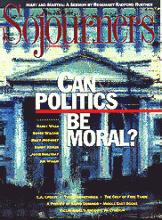With these readings, the liturgical year comes to a close. The themes during these weeks appropriately center on the many aspects of "the end time," God's reign, the inbreaking of the kingdom. This was the central aspect of Jesus' mission, even before he himself came on the scene: "In those days John the Baptist appeared, preaching in the desert of Judea and saying, 'Repent, for the kingdom of heaven is at hand!'" (Matthew 3:1-2). For the person of faith, this promise stands at the very core of life and action. We pray constantly "thy kingdom come" and act "as if" that peaceable reign were increasingly actualized within, among, and around us. Hope tells us that it is.
November 1: Signs of Hope
Haggai 2:1-9; 2 Thessalonians 1:5-12; Luke 19:1-10
Our modern understanding of the world as an interdependent global village makes it imperative to read the Zacchaeus story in structural terms. The little rich man in the sycamore tree, to whose house Jesus invites himself, is every well-to-do person and nation that, like Zacchaeus, has sometimes done injustices to attain status. One sign of God's reign appears when their questionable privileges are given back to those whom they have cheated: "If I have extorted anything from anyone I shall repay it four times over." What a difference it would make in this world if rich governments and banks were to apply this Zacchaeus principle--for example, to Third World debt and debt service.
Read the Full Article

